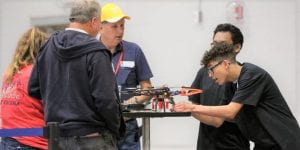Thank you for your interest in Sea, Air and Land Challenge! We believe the engineering mentor relationship with the team is critical to the learning process. This is often the first time students have engaged in complex engineering and fabrication. Thus, a dedicated mentor with a technical background can add significant illumination on the process, and help ease some of the concerns or growing pains associated with experiencing the engineering process for the first time.
About the Challenge:
This high school initiative is an Office of Naval Research Sponsored program, in which teams of students learn the engineering process through the design of a system relevant to the Department of Defense. The students have twelve to sixteen weeks (often one semester) to work on their systems in the classroom. The systems are then used to compete in challenges that mimic missions encountered by the military, national security agencies and first responders. For detailed instructions and guidelines about the challenges offered, please refer to https://seaairland.psu.edusecure/. Use the password provided by the team’s educator or the Regional Coordinator.
Some Challenge teams will meet during or after school, but with the wide use of video conference calling, email and phone, you may never need to visit the school in person to communicate successfully with the students. Perhaps you only have one or two hours a month, no problem! Our teams appreciate any time you can give! Mentors report spending 4-10 hours over the duration of the semester-long program.
As a volunteer engineering mentor, you will be a resource for questions and can provide feedback on plans and prototypes. The mentor is not to perform work, but should provide process and design suggestions if requested. Mentor objectives include the following:
• Guide through the Engineering Process
• Ensure technical approaches are valid
• Keep the team motivated and on schedule
• Review Preliminary Design Report (PDR) & provide feedback prior to the team’s purchase of supplies
• Review the optional Critical Design Report (CDR) & provide feedback
• Attend Challenge Day (optional)
As a mentor, it is important to realize that most educators are not engineers. It is your job to help the educator in this area. Collaborate with one another to achieve success in the classroom. This can be accomplished by reviewing the challenge guidelines and preparing lists of questions for the students prior to the first session. Have an idea of what you want each work session to look like prior to visiting the classroom.
The safety of all students is a priority. Please refer to the school for guidelines for mentor interactions and the clearances and background checks required to become a mentor.
The Sea Air and Land Challenge is not a competition based on winning. All of the teams are winners and this is about the journey, not the finish line! Teams are judged based upon the team’s innovation and use of the engineering design process in building a vehicle and its ability to maneuver through a designated unknown course.
For more information or to find a Challenge event near you contact headquarters at:
The Pennsylvania State University
222 Northpointe Blvd.
Freeport, PA 16229
(724) 295-7000
seaairland@arl.psu.edu
Suggested Deadlines
Typical Fall Semester Activities
- Review Videos
- Review Survival Guide
- School Registration
- Team Recruiting
- Structure Teams
- Choose Challenges
- Team Fund-raising
- Name Engineering Mentors & Volunteers
- Student Registration
- Pre-Challenge Survey for students
Typical Spring Semester Activities
- Form teams, register and take pre-Challenge survey, if not complete
- Begin Design Process
- Equipment Research
- Preliminary Design Review (PDR) due for Review
- Critical Design Review (CDR) OPTIONAL for Review
- Fabrication and Testing Phase
- Pilot Qualification/Flight Certification Test
- Challenge Day
- Surveys (Required) for Educators, Students, Mentors
- Final Reports (Optional)
Timeline
Challenge registration begins in September and runs through the Fall Semester. Teams work in December to develop their team strategies and begin designing in January. They have 12 to 16 weeks to build their systems.
Go to Section…
Overview
Mentor a Team
Cost & Funding
Support
